导学案人教版七年级下册英语 导学案 unit10导学案5课时
人教版七年级英语下册《Unit10阅读学法指导课》导学案(含答案)
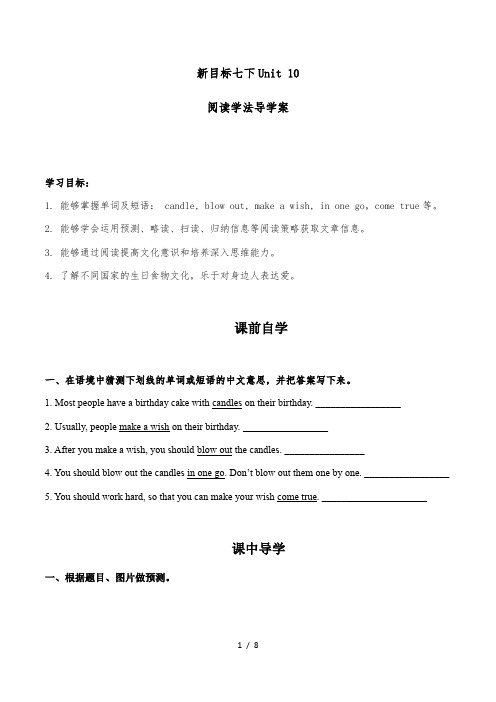
新目标七下Unit 10阅读学法导学案学习目标:1. 能够掌握单词及短语: candle, blow out, make a wish, in one go,come true等。
2.能够学会运用预测、略读、扫读、归纳信息等阅读策略获取文章信息。
3.能够通过阅读提高文化意识和培养深入思维能力。
4. 了解不同国家的生日食物文化,乐于对身边人表达爱。
课前自学一、在语境中猜测下划线的单词或短语的中文意思,并把答案写下来。
1. Most people have a birthday cake with candles on their birthday. _________________2. Usually, people make a wish on their birthday. _________________3. After you make a wish, you should blow out the candles. ________________4. You should blow out the candles in one go. Don’t blow out them one by one. _________________5. You should work hard, so that you can make your wish come true. _____________________课中导学一、根据题目、图片做预测。
1. What is the article mainly about?______________________________________________________________________2. How old is the girl?______________________________________________________________________二、运用略读策略,选择段落大意。
人教版英语七下Unit10导学案

Unit 10 Where did you go in vacation?导学案一、学习目标、重点、难点学习目标:1. 学会谈论过去发生的事情,并学会谈论节假日的活动2. 掌握一般过去时的用法3. 学会以日记的形式记录一天的活动并表达自己的感情学习重难点:1. 学会谈论过去发生的事情,并学会谈论节假日的活动2. 掌握一般过去时的用法二、知识概览图三、新课导引The teacher asks the students the following questions:1. Do you like vacation? Why?2. Did you go on vacation?3. Where did you go?四、教材精华1. Where did you go on vacation?你去哪里度假了?这是一个一般过去时的特殊疑问句,其句式结构为“特殊疑问词+一般疑问句?”句中的特殊疑问词为where, did是助动词do的过去式。
On vacation为固定短语,意为“度假”,相当于on holiday.Where did he go last week? 上周他去哪里了?2. Did you / he /she/they go to Central Park?②你/他/她/他们去中央公园了吗?本句是含有实义动词的一般过去时的一般疑问句,助动词did 提前,原陈述句中的过去式改为原形,即“Did+主语+动词原形+其他?”其肯定回答为“Yes,主语+did”;否定回答为“No,主语+didn’t”.—Did she go to the beach? 她去海滩了吗?—Yes, she did./No, she didn’t. 是的,她去了。
/不,她没去。
was pretty good.相当好。
这是一个“主语+系动词+表语”句型,简称“主系表”结构。
pretty在这里为副词,意为“相当,非常”用于修饰形容词或副词。
(人教版)2019年春新目标七年级下册英语:全册配套导学案unit_10导学案5课时
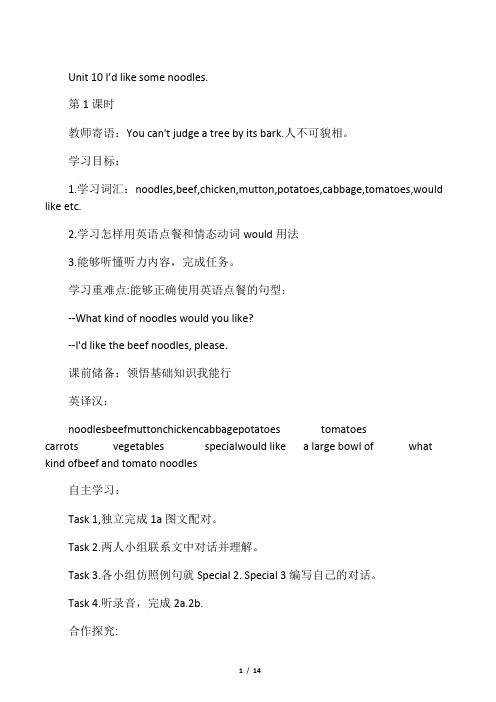
Unit 10 I’d like some noodles.第1课时教师寄语:You can't judge a tree by its bark.人不可貌相。
学习目标:1.学习词汇:noodles,beef,chicken,mutton,potatoes,cabbage,tomatoes,would like etc.2.学习怎样用英语点餐和情态动词would用法3.能够听懂听力内容,完成任务。
学习重难点:能够正确使用英语点餐的句型:--What kind of noodles would you like?--I'd like the beef noodles, please.课前储备:领悟基础知识我能行英译汉:noodlesbeefmuttonchickencabbagepotatoes tomatoescarrots vegetables specialwould like a large bowl of what kind ofbeef and tomato noodles自主学习:Task 1,独立完成1a图文配对。
Task 2.两人小组联系文中对话并理解。
Task 3.各小组仿照例句就Special 2. Special 3编写自己的对话。
Task 4.听录音,完成2a.2b.合作探究:1,1a中的名词中属于可数名词的是:_______________________________属于不可数名词的是_____________________________________________2,说话练习:-- What would you like? -- I'd like beef noodles,please.--What kind of noodles would you like?-- I'd like the beef noodles, please.注:1,would like的用法(1):wouldlike意为想要,愿意,相当于want,用于提出要求或建议;但语气比want委婉,一般有一下三种形式:①would like sth.想要某物如:我想要些冰淇淋。
七年级下英语Unit_10_导学案_
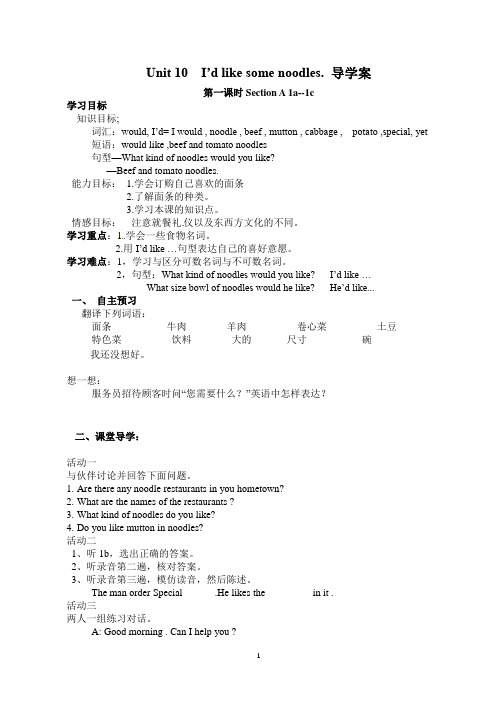
Unit 10 I’d like some noodles.导学案第一课时Section A 1a--1c学习目标知识目标;词汇:would, I’d= I would , noodle , beef , mutton , cabbage , potato ,special, yet短语:would like ,beef and tomato noodles句型—What kind of noodles would you like?—Beef and tomato noodles.能力目标:1.学会订购自己喜欢的面条2.了解面条的种类。
3.学习本课的知识点。
情感目标:注意就餐礼仪以及东西方文化的不同。
学习重点:1.学会一些食物名词。
2.用I’d like …句型表达自己的喜好意愿。
学习难点:1,学习与区分可数名词与不可数名词。
2,句型:What kind of noodles would you like? I’d like …What size bowl of noodles would he like? He’d like...一、自主预习翻译下列词语:面条_________ 牛肉______ 羊肉________ 卷心菜__________土豆__________ 特色菜_________ 饮料_______ 大的_______尺寸_________ 碗__________我还没想好。
______________想一想:服务员招待顾客时问―您需要什么?‖英语中怎样表达?____________________________________________二、课堂导学:活动一与伙伴讨论并回答下面问题。
1.Are there any noodle restaurants in you hometown? ________________________________2.What are the names of the restaurants ? _________________________________3.What kind of noodles do you like? ____________________________________4.Do you like mutton in noodles? ___________________________________ 活动二1、听1b,选出正确的答案。
新版人教版七年级下册英语导学案(全册)
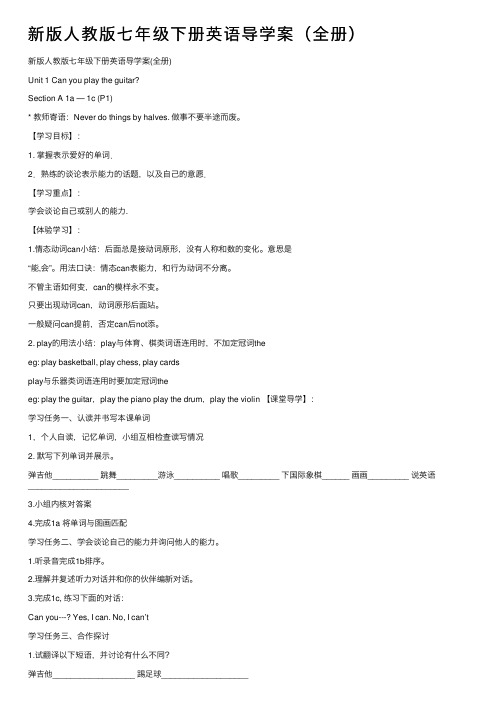
新版⼈教版七年级下册英语导学案(全册)新版⼈教版七年级下册英语导学案(全册)Unit 1 Can you play the guitar?Section A 1a — 1c (P1)* 教师寄语:Never do things by halves. 做事不要半途⽽废。
【学习⽬标】:1. 掌握表⽰爱好的单词.2.熟练的谈论表⽰能⼒的话题,以及⾃⼰的意愿.【学习重点】:学会谈论⾃⼰或别⼈的能⼒.【体验学习】:1.情态动词can⼩结:后⾯总是接动词原形,没有⼈称和数的变化。
意思是“能,会”。
⽤法⼝诀:情态can表能⼒,和⾏为动词不分离。
不管主语如何变,can的模样永不变。
只要出现动词can,动词原形后⾯站。
⼀般疑问can提前,否定can后not添。
2. play的⽤法⼩结:play与体育、棋类词语连⽤时,不加定冠词theeg: play basketball, play chess, play cardsplay与乐器类词语连⽤时要加定冠词theeg: play the guitar,play the piano play the drum,play the violin 【课堂导学】:学习任务⼀、认读并书写本课单词1,个⼈⾃读,记忆单词,⼩组互相检查读写情况2. 默写下列单词并展⽰。
弹吉他__________ 跳舞_________游泳__________ 唱歌_________ 下国际象棋______ 画画_________ 说英语______________________3.⼩组内核对答案4.完成1a 将单词与图画匹配学习任务⼆、学会谈论⾃⼰的能⼒并询问他⼈的能⼒。
1.听录⾳完成1b排序。
2.理解并复述听⼒对话并和你的伙伴编新对话。
3.完成1c, 练习下⾯的对话:Can you---? Yes, I can. No, I can’t学习任务三、合作探讨1.试翻译以下短语,并讨论有什么不同?弹吉他__________________ 踢⾜球___________________2.讨论如何询问第三⼈称能⼒的句型---Can he sing? ---Yes, he can. / No, he can't.---Can Tom speak English? ---Yes, he can. / No, he can't.【⾃主检测】:I.精挑细选1. Can you ________ English?A. speakB. talkC. say2. Can he __________ basketball?A. playB. playsC. playing3. My brother want _______ the chess club.A. joinB. to joinC. joins4. Mary can play the chess________ she can't swim.A. andB. orC. but5. His brother plays _______ piano every day.A. /B. aC. theII.翻译官说英语_____________ 弹吉他_____________ 象棋俱乐部__________ 下象棋______________ 英语俱乐部_____________ ⾳乐俱乐部__________ 美术俱乐部___________ 游泳俱乐部_____________ 参加___________ Ⅲ. 补全对话A. Can you ___________(唱歌)?B. Yes, I ________. Can you _________(游泳)?A. No, I want to join _______________(象棋俱乐部).B. I don't like ______________(象棋)A. What club do you want to __________?Unit 1 Can you play the guitar?Section A 2a— 2d (P2)* 教师寄语:Never do things by halves. 做事不要半途⽽废。
人教版英语七下U10课前预习导学案
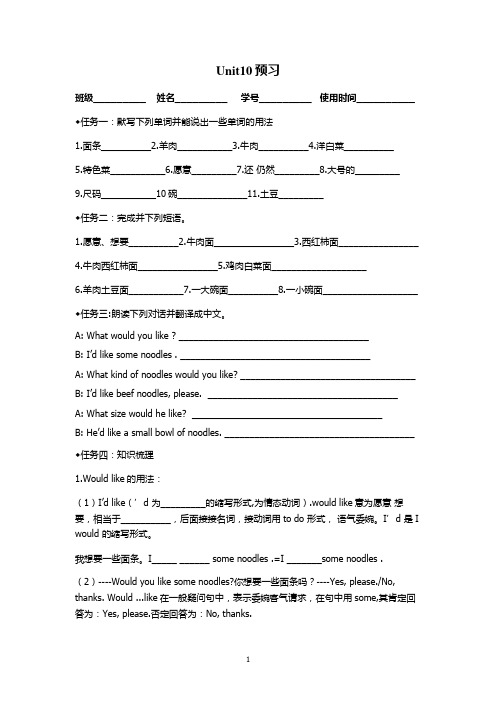
Unit10预习班级_________ 姓名_________ 学号_________ 使用时间__________◆任务一:默写下列单词并能说出一些单词的用法1.面条__________2.羊肉___________3.牛肉__________4.洋白菜__________5.特色菜___________6.愿意_________7.还仍然_________8.大号的_________9.尺码___________10碗______________11.土豆_________◆任务二:完成并下列短语。
1.愿意、想要__________2.牛肉面________________3.西红柿面________________4.牛肉西红柿面________________5.鸡肉白菜面___________________6.羊肉土豆面___________7.一大碗面__________8.一小碗面___________________◆任务三:朗读下列对话并翻译成中文。
A: What would you like ? ______________________________________B: I’d like some noodles . ______________________________________A: What kind of noodles would you like? ___________________________________ B: I’d like beef noodles, please. ______________________________________A: What size would he like? ______________________________________ B: He’d like a small bowl of noodles. ______________________________________◆任务四:知识梳理1.Would like的用法:(1)I’d like(’d 为_________的缩写形式,为情态动词).would like意为愿意想要,相当于__________,后面接接名词,接动词用to do 形式,语气委婉。
2019-2020年人教版英语七年级下册 Unit10 第五课时导学案 (无答案)

一导入新课,明确目标
情景导入
展示Байду номын сангаас单元的食物图片,引出句型what would you like?及其回答
二自主学习,用心思考
1自主学习
Scan the content ,make a list about some important words、phases、sentences
Look! Your house is out of order.(看你的家太乱了)
可构成词组:out of order,次序紊乱,in order按照顺序,in order to为了...,keep order维持秩序
五当堂训练,检测目标(根据汉语提示完成句子)
1 He`d like a bowl of noodles___chicken and cabbage
4 What __bowl of noodles would you like, small or large?
A kind B size C color D time
六总结反思,拓展延伸
学生总结,教师板书
Homework
学习目标:学习用英语询问他人喜欢的食物,谈论自己喜欢的食物
学习重、难点:would like句型
A has B have C with D in
2 We ___have dumplings and green tea.
A also B too C either D neither
3What __of noodles would you like?
A bowl B size C kind D for
七年级英语科新知探究导学案主备:时间:审核:
人教版七年级英语下册Unit 10导学案第1--6课时

Unit 10 I’d like some noodles.Section A 1a — 1c (P55)* 教师寄语:An apple a day keeps the doctor away. 一天一苹果,医生远离我。
【学习目标】【学习重点】:1、学习常用食物词汇;2、学会如何预定食物。
--What would you like? -- I’d like some…./I’m not sure yet.【体验学习】:I、预习交流1.根据单元标题和图片等,预测新课内容;2.根据音标拼读单词并牢记;3.自学课文,勾画出重点和疑惑。
II、翻译官1. 想要,喜欢_________________2. 牛肉面____________________4. 鸡肉_____________________5. 羊肉 ______________________3. 卷心菜___________________ 6. 胡萝卜_____________________7. 土豆(复数) _______________ 8. 西红柿(复数) _______________9. special ___________________ 10. 我还没想好。
_______________【课堂导学】:I、新课呈现Step1 Brainstorming(头脑风暴)Try to speak out the names of food you know.Step2 Presentation1.Learn the new words about food in 1a.2.Finish 1a, then check the answers.3.Look at the picture in 1a and learn the drills:--What would you like? -- I’d like some….Step3 ListeningListen and finish 1b. Check the answers.Step4 Pair workPractice the conversations in 1a .Then make your own conversations. II、合作交流Group work: 分析总结如何预定食物,并练习造句。
人教版七年级下册英语unit 10 导学案(最新最全)

Unit 10 I’d like some noodles.第三四课时单词知识点some 用于疑问句时,表示建议、请求或希望得到肯定回答。
如:Would you like some coffee with sugar?你要加糖的咖啡吗?any 一般用于疑问句或否定句中, 意思是“任何一些”、“任何一个”, 作定语时可修饰可数或不可数名词。
如:They didn’t have any friends he re.他们在这里没有朋友。
any 用于肯定句时,意思是“任何的”. Eg. Come here with any friend. 随便带什么朋友吧。
28. the number of …….的数量。
后接复数名词,中心词为number,因此该短语主语时,谓语动词用单数。
eg. The number of students in our school is more than six thousand.我们学校学生数是6000多。
A number of许多的……. 。
做主语时,谓语动词用复数形式。
eg: A number of students in our school are friendly. 我们学校很多学生是友好的。
29. 名词:可数名词与不可数名词A、不可数名词,初中阶段常见的不可数名词有:water ; meat ; rice ; bread ; milk ; tea ;orange(桔汁) ; fruit ; air ; snow ; chalk; work ; paper(纸) ; time(时间); music ; weather ;grass ; news ; food ; fish(鱼肉); coke ; porridge ; cake(可数或不可数). 不可数名词应注意以下几点:1)前无数、冠,后无复数;作主语为三单.2)表量用约数some /any ; much ; a lot of 或用of短语eg. There is ____ bread on the table. [C]A. aB. oneC. a piece ofD. manyThere is some_______ on the plate. [B]A. appleB. fishC. milksD. deer2、可数名词的复数:A、不规则变化:man—men ; woman—women ;child—childrenpoliceman—policemenEnglishman—EnglishmenFrenchman—Frenchmenfoot—feet ; tooth—teeth mouse(鼠)—miceB、规则变化1)s; sh; ch; x 结尾加 es 读 [iz]2) ce; se; ze; (d)ge 结尾加 seg. boxes [b ksiz] blouses [blauziz]3)f (fe) 结尾则变f(fe)为v加es---读[vz]eg. knives [naivz] 4) “辅+y”结尾变y为i加es 清就清[s]5)一般加s 浊就浊[z]eg. books[buks] pens[penz] babies[beibiz]但注意以下几点:① potato—potatoes ; tomato—tomatoes②单复同形: fish ; sheep ; deer ; Chinese ; Japanese③由man , woman在词首构成的复合名词应将两部分都变成复数man doctor — men doctors④ reef—reefs⑤“某国人”的复数:中日不变英法变,其余s加后面. eg. German—Germans⑥ people , police 常用单数形式表示复数概念.eg. The police are looking for the missing boy.3、名词所有格:名词’s (意思是“……的”)A.有生命的名词所有格,一般在后加“’s”但注意:1)表两者共有则在后者加“’s”Lucy and Lily’s father 露西和莉莉的父亲Luc y’s and Lily’s fathers露西的父亲和莉莉的父亲.2)以s结尾的词只加“ ’ ”eg. 1) the boys’ books 2) James’ father3)无生命的名词所有格用of来引导eg. the leg of the desk4)双重所有格:a friend of my father’sa friend of mine ( √ ) a friend of my( × )练习:一、写出下列词的复数1.book______2.bus ____ __3.orange ___ ____4.baby__ ____5.boy__ ____6.my ____ ____7.his__ _____8.knife____ __9.watch______ __10.sheep ___ ___ 11. tooth __ ___12. leaf ___ _13.German___ _______ 14.Chinese_____ ____Unit 10 I’d like some noodles.orUnit 10 I’d like some noodles.自测一第十三课时一.根据首字母或汉语提示,写出单词。
人教版七年级英语下册unit10第五课时导学案设计(无答案)
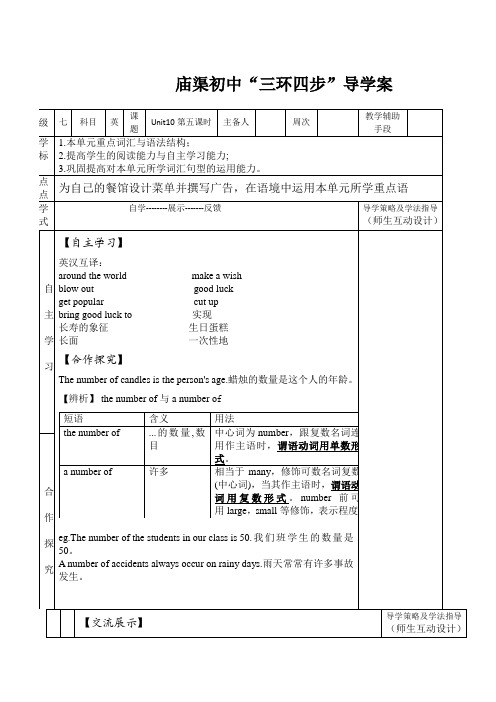
Task 2.试想一下,你有一家餐馆,请写出餐馆有的食物和位置。
Task 3.参照所给句型结构试给你的餐馆写一则广告。
合作探究:小组合作我最棒
1.3a中的疑难问题小组交流解决。
2.3c写作,组内探究交流写作方法。进行写作。
展示反馈
1.读3a短文。看谁读得又准确又有语感。
导学策略及学法指导(师生互动设计)
反
馈
检
测
教
后
反
思
导
学
过
程
四
步
设
计
自
主
学
习
【自主学习】
英汉互译:
around the world___________ make a wish___________
blow out__________ good luck_______________
get popular______________ cut up___________
2.小组互展:选出组内好作文。
3.班内大展:看谁写的最出色。
【反馈检测】
一,单项选择
1. He_____ some bananas.
A.would like B.want C. would like D. want to buy
2. There_____ beef on the table.
A. are many B. is much C. has some D. are much
年级
七
科目
英
课题
Unit10第五课时
主备人
周次
教学辅助手段
导学
目标
1.本单元重点词汇与语法结构;
七年级英语下10单元导学案第五课时
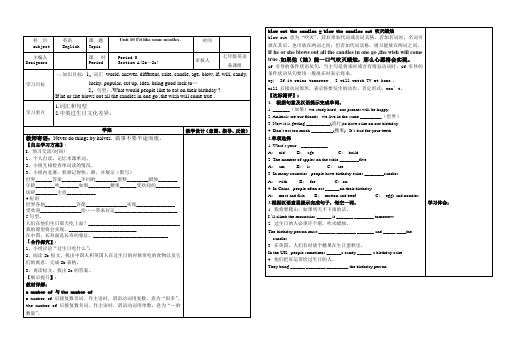
subject
英语
English
课题
Topic
Unit10I’d like some noodles .
时间
主编人
Designers
课时Period
Period 5
Section A(2a—2c)
审核人
七年级英语备课组
学习目标
一.知识目标:1.词汇world, answer, different, cake, candle, age, blow, if, will, candy, lucky, popular, cut up, idea, bring good luck to…
4.短语
世界各地_____________许愿_________________实现________________
受欢迎_________________给……带来好运__________________________
5.句型。
人们在他们生日那天吃上面?______________________________________
学案
教学设计(意图、指导、反馈)
教师寄语:Never do things by halves.做事不要半途而废。
【自主学习方案】:
I、预习交流(时间)
1、个人自读、记忆本课单词。
2、小组互相检查单词读的情况。
3、小组内竞赛,看谁记得快、准,并展示(默写)
世界_______答案________不同的_________蛋糕_________蜡烛________年龄________吹________如果_________糖果_______受欢迎的__________切碎_________主意____________
七年级英语下册Unit10第5课导学案
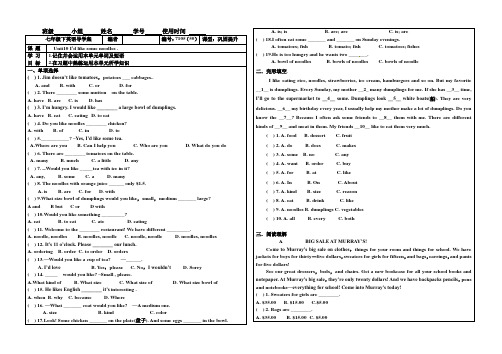
班级小组姓名学号使用时间七年级下英语导学案编者编号:7105(50)课型:巩固提升课题Unit10 I’d like some noodles .学习目标1.记住并会运用本单元单词及短语2.在习题中熟练运用本单元所学知识一、单项选择( ) 1. Jim doesn’t like tomatoes,potatoes ___ cabbages..A. andB. withC. orD. for( ) 2. There ________ some mutton on the table.A. haveB. areC. isD. has( ) 3. I’m hungry. I would like ________ a large bowl of dumplings.A. haveB. eatC. eatingD. to eat( ) 4. Do you like noodles ________ chicken?A. withB. ofC. inD. to( ) 5.___________? –Yes, I’d like some tea.A.Where are youB. Can I help youC. Who are youD. What do you do ( ) 6. There are ________ tomatoes on the table.A. manyB. muchC. a littleD. any( ) 7. --Would you like _____tea with ice in it?A. any,B. someC. aD. many( ) 8. The noodles with orange juice ______ only $1.5.A. isB. areC. forD. with( ) 9.What size bowl of dumplings would you like,small,medium _______ large?A andB butC orD with( ) 10.Would you like something _________?A. eatB. to eatC. ateD. eating( ) 11. Welcome to the ________ restaurant! We have different _________.A. noodle, noodlesB. noodles, noodleC. noodle, noodleD. noodles, noodles ( ) 12. It’s 11 o’clock. Please ________ our lunch.A. orderingB. orderC. to orderD. orders( ) 13.—Would you like a cup of tea? —______.A. I’d loveB. Yes,pleaseC. No,I wouldn’tD. Sorry( ) 14. _____ would you like? –Small , please.A.What kind ofB. What sizeC. What size ofD. What size bowl of ( ) 15. He likes English ________ it’s interesting .A. whenB. whyC. becauseD. Where( ) 16.—What _______ coat would you like? —A medium one.A. sizeB. kindC. color( ) 17.Look! Some chicken _______ on the plate(盘子). And some eggs _______ in the bowl.A. is; isB. are; areC. is; are( ) 18.I often eat some _______ and _______ on Sunday evenings.A. tomatoes; fishB. tomato; fishC. tomatoes; fishes( ) 19.He is too hungry and he wants two _______.A. bowl of noodlesB. bowls of noodlesC. bowls of noodle二.完形填空.I like eating rice, noodles, strawberries, ice cream, hamburgers and so on. But my favorite __1__ is dumplings. Every Sunday, my mother __2_ many dumplings for me. If she has __3__ time, I’ll go to the supermarket to __4__ some. Dumplings look __5__ white boats(船). They are very delicious. __6__ my birthday every year, I usually help my mother make a lot of dumplings. Do you know the __7__? Because I often ask some friends to __8__ them with me. There are different kinds of __9__ and meat in them. My friends __10__ like to eat them very much.( ) 1. A. food B. dessert C. fruit( ) 2. A. do B. does C. makes( ) 3. A. some B. no C. any( ) 4. A. want B. order C. buy( ) 5. A. for B. at C. like( ) 6. A. In B. On C. About( ) 7. A. kind B. size C. reason( ) 8. A. eat B. drink C. like( ) 9. A. noodles B. dumplings C. vegetables( ) 10. A. all B. every C. both三.阅读理解A BIG SALE AT MURRAY’S!Co me to Murray’s big sale on clothes,things for your room and things for school. We have jackets for boys for thirty-five dollars,sweaters for girls for fifteen,and bags,earrings,and pants for five dollars!See our great dressers,beds,and chairs. Get a new bookcase for all your school books and notepaper. At Murray’s big sale,they’re only twenty dollars! And we have backpacks pencils,pens and notebooks—everything for school! Come into Murray’s today!( ) 1. Sweaters for girls are ________.A. $35.00B. $15.00C.$5.00( ) 2. Bags are ________.A. $35.00B. $15.00C. $5.00( ) 3. ________ for boys are on sale for $35.00.A. JacketsB. SweatersC. Belts( ) 4. Murray’s doesn’t have ________ on sale.A. dressersB. tablesC. chairs( ) 5.________ are $20.00.A. BookcasesB. BooksC. PapersBHello! My name is Peter. I am from Canada. Now I live in China with my parents. I like China. I like Chinese food, too. I have breakfast at home. I eat an egg, some bread and porridge for breakfast. I don’t like m ilk. I don’t have enough(足够的) time to go home for lunch. I usually have lunch at school. The lunch in our school is pretty good. There are many different kinds of food for us. I often eat rice, meat and vegetabl es. Sometimes I have noodles and dumplings. I always have dinner at home with my parents. We have fish, meat, vegetables, desserts and fruit.根据短文,填写恰当内容完成下列表格。
人教版七年级下册英语 导学案 unit10导学案5课时 精品
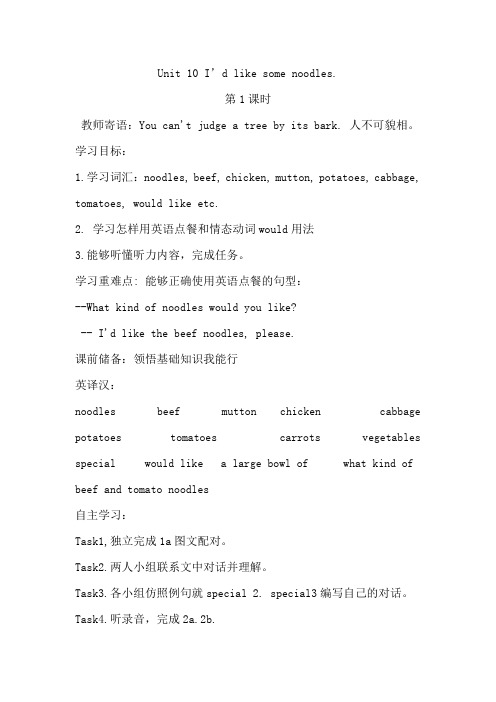
Unit 10 I’d like some noodles.第1课时教师寄语:You can't judge a tree by its bark. 人不可貌相。
学习目标:1.学习词汇:noodles, beef, chicken, mutton, potatoes, cabbage,tomatoes, would like etc.2. 学习怎样用英语点餐和情态动词would用法3.能够听懂听力内容,完成任务。
学习重难点: 能够正确使用英语点餐的句型:--What kind of noodles would you like?-- I'd like the beef noodles, please.课前储备:领悟基础知识我能行英译汉:noodles beef mutton chicken cabbage potatoes tomatoes carrots vegetables special would like a large bowl of what kind of beef and tomato noodles自主学习:Task1,独立完成1a图文配对。
Task2.两人小组联系文中对话并理解。
Task3.各小组仿照例句就special 2. special3编写自己的对话。
Task4.听录音,完成2a.2b.合作探究:1,1a中的名词中属于可数名词的是:_______________________________属于不可数名词的是_____________________________________________2,说话练习:-- What would you like? -- I'd like beef noodles,please. --What kind of noodles would you like?-- I'd like the beef noodles, please.注:1,would like的用法(1):would like 意为想要,愿意,相当于want,用于提出要求或建议;但语气比want委婉,一般有一下三种形式:①would like sth. 想要某物如:我想要些冰淇淋。
七年级下导学案Unit 10 I
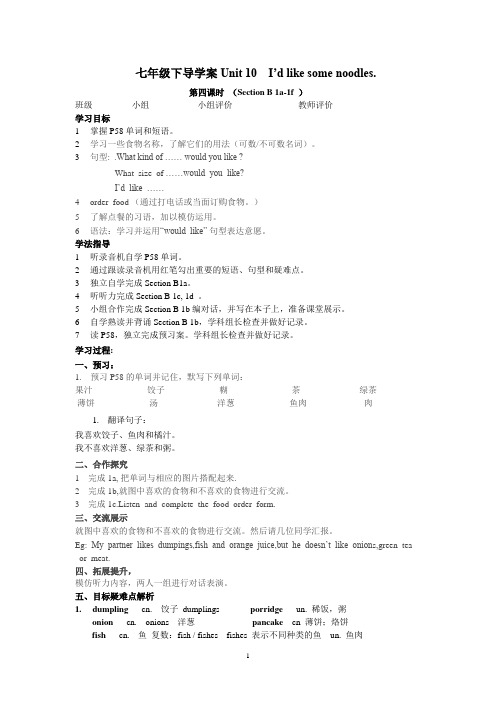
七年级下导学案Unit 10 I’d like some noodles.第四课时(Section B 1a-1f )班级小组小组评价教师评价学习目标1掌握P58单词和短语。
2学习一些食物名称,了解它们的用法(可数/不可数名词)。
3句型: .What kind of …… would you like ?What size of ……would you like?I’d like ……4order food (通过打电话或当面订购食物。
)5了解点餐的习语,加以模仿运用。
6语法:学习并运用―would like‖句型表达意愿。
学法指导1听录音机自学P58单词。
2通过跟读录音机用红笔勾出重要的短语、句型和疑难点。
3独立自学完成Section B1a。
4听听力完成Section B 1c, 1d 。
5小组合作完成Section B 1b编对话,并写在本子上,准备课堂展示。
6自学熟读并背诵Section B 1b,学科组长检查并做好记录。
7读P58,独立完成预习案。
学科组长检查并做好记录。
学习过程:一、预习:1. 预习P58的单词并记住,默写下列单词:果汁____________ 饺子____________ 糊______________ 茶_____________ 绿茶__________ 薄饼____________ 汤_____________ 洋葱____________ 鱼肉_____________肉_______1.翻译句子:我喜欢饺子、鱼肉和橘汁。
______________________________________________我不喜欢洋葱、绿茶和粥。
_____________________________________________二、合作探究1 完成1a, 把单词与相应的图片搭配起来.2 完成1b,就图中喜欢的食物和不喜欢的食物进行交流。
3 完成1c.Listen and complete the food order form.三、交流展示就图中喜欢的食物和不喜欢的食物进行交流。
- 1、下载文档前请自行甄别文档内容的完整性,平台不提供额外的编辑、内容补充、找答案等附加服务。
- 2、"仅部分预览"的文档,不可在线预览部分如存在完整性等问题,可反馈申请退款(可完整预览的文档不适用该条件!)。
- 3、如文档侵犯您的权益,请联系客服反馈,我们会尽快为您处理(人工客服工作时间:9:00-18:30)。
Unit 10 I’d like some noodles.第1课时教师寄语:You can't judge a tree by its bark. 人不可貌相。
学习目标:1.学习词汇:noodles, beef, chicken, mutton, potatoes, cabbage,tomatoes, would like etc.2. 学习怎样用英语点餐和情态动词would用法3.能够听懂听力内容,完成任务。
学习重难点: 能够正确使用英语点餐的句型:--What kind of noodles would you like?-- I'd like the beef noodles, please.课前储备:领悟基础知识我能行英译汉:noodles beef mutton chicken cabbage potatoes tomatoes carrots vegetables special would like a large bowl of what kind of beef and tomato noodles自主学习:Task1,独立完成1a图文配对。
Task2.两人小组联系文中对话并理解。
Task3.各小组仿照例句就special 2. special3编写自己的对话。
Task4.听录音,完成2a.2b.合作探究:1,1a中的名词中属于可数名词的是:_______________________________属于不可数名词的是_____________________________________________2,说话练习:-- What would you like? -- I'd like beef noodles,please. --What kind of noodles would you like?-- I'd like the beef noodles, please.注:1,would like的用法(1):would like 意为想要,愿意,相当于want,用于提出要求或建议;但语气比want委婉,一般有一下三种形式:①would like sth. 想要某物如:我想要些冰淇淋。
I would like some ice cream. ②would like to do sth. 想要干某事如:我想要和你一起去。
I would like to go with you. ③would like sb. to do sth. 想要某人做某事如:我想要她去接你。
I would like her to meet you. 注意:would like 中的would 在句中经常和前面的主语缩写成’d, 如 I’d = I would, You’d = You would, He’d = He would.2, What kind of ? would you like? 你想要?? 本句是特殊疑问句,用来询问某人想要什么种类的东西,经常用What kind of + 名词+ would you like? EG:--What kind of noodles would you like? --Beef and tomato noodles, please. 展示反馈1、小组互展:对话中使用句型是否正确,听力填入空格中的单词是否准确。
2、全班大展。
自我反思小结:_________________________________________________________________________________________________________________________________达标训练: 基本题型我过关一、英汉互译1. 想要 _____________2. what kind of _______________3. 特色菜 _______________4. 牛肉西红柿面 _____________5. noodle(复数)_______________6. tomato(复数)_____________7. He’d(完全形式) ______________ 8. potato(复数)____________9. I’d(完全形式)______________ 10. would like___________二、按要求改写句子。
1. I’d like some beef.(改为一般疑问句)_________ _________ _________ _________ beef?2. Those boys want four large bowls of rice.(改为同义句) Thoseboys _________ _________ four large bowls of rice.3. Mary would like tomato and egg noodles.(对画线部分提问)_________ _________ of noodles would Mary like?4..Anna would like a small bowl of rice (对划线部分提问)_____________________________________________5. 你想去看电影吗?______ you like ______ _______ to the movies?6. 你喜欢鸡肉还是羊肉? Do you like ______ or ______?Unit 10第2课时Section A 2d-3d教师寄语:You can't judge a tree by its bark. 人不可貌相。
学习目标:1、与食物相关的各种词汇,;2、总结归纳并学会运用Section A部分知识重点;3、能分辨并正确使用可数名词及不可数名词。
学习重难点:点餐时常用的句型和不定代词some和any的用法。
What kind of dumplings would you like? I’d like…..课前储备:英汉互译:1. 两碗米饭___________________2,一些鸡肉_____________3. beef and tomato noodles _______________4. I’d like some noodles . _____5. a small bowl of noodles._______________6.一大碗牛肉汤__________7. chicken, potato and cabbage noodles _________________8,____________________热身练习:-- What would you like? -- I'd like ….--What kind of …would you like? -- I'd like ...自主学习:Task1.自学Role-play,回答问题:a) What would Sally and Tom like to eat? ___________________________b) How many bowl of soup would Sally and Tom like to have? _______________________________________c) What size would they like? ___________________________ Task2.完成3a-3c的任务合作探究:根据Grammar Focus, 梳理总结Section A部分知识重点;would like的用法(2)一般疑问句与特殊疑问句:句式一:陈述句变一般疑问句,把情态动词移到句首, I 变为you。
eg: I would like some milk.. Would you like some milk?注意:其中的some 没有变成 any 是因为句子表达的是“要求,请求,提供需要”的意思,在这种情况下,句中的some 不需要变成any句式二:陈述句变成否定句 eg: I would like some milk. I wouldnot like any milk? 变为否定句时,在情态动词后面加not,将some变any.句式三:特殊疑问句(对划线部分提问) I would like some milk? What would you like?展示反馈:1、小组互展。
2、全班大展。
自我反思小结:__________________________________________________________________________________________________________________________________达标练习:一,根据句意、首字母、汉语提示完成下列句子。
1.China is a l__________ country with long history.2.What s________ shoes would you like?3. We often have rice,meat,________(西红柿) for lunch everyday.4.They usually ________(订购) food and drink in this restaurant.5.________(星期四) is the fifth day of a week二,根据汉语完成句子。
1. 你要点什么?_______ I _______ you _______?2. 你想要多大的短裙?_______ _______ skirt _______ you like?3. 我想和你一起共进晚餐。
I _______ ________ to have dinner _______ you.4. 我想要一小碗牛肉面。
I _______ _______ a _______ bowl of _______ noodles.三,根据要求完成下列句子。
1. Can I help you? (同义句)___________________________________2.Anna would like a small bowl of rice (对划线部分提问)_____________________________________________3. She’d like a medium bag of apples.(对画线部分提问)_________ _________ bag of apples would she like?Unit 10第3课时教师寄语:One false step will make a great difference. 失之毫厘,缪之千里。
